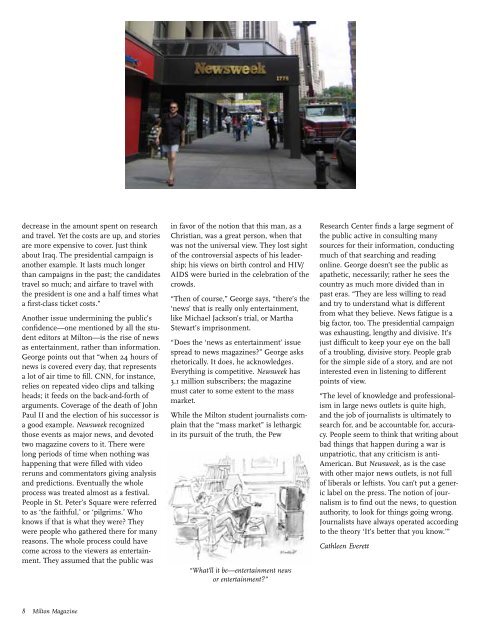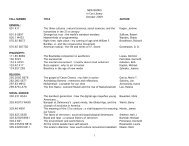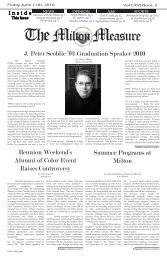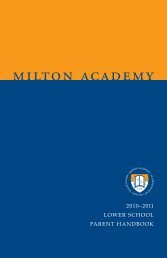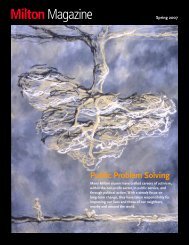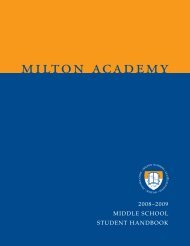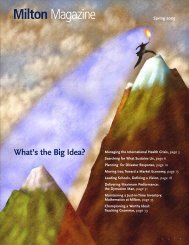decrease in the amount spent on researchand travel. Yet the costs are up, and storiesare more expensive to cover. Just thinkabout Iraq. The presidential campaign isanother example. It lasts much longerthan campaigns in the past; the candidatestravel so much; and airfare to travel withthe president is one and a half times whata first-class ticket costs.”Another issue undermining the public’sconfidence—one mentioned by all the studenteditors at <strong>Milton</strong>—is the rise of newsas entertainment, rather than information.George points out that “when 24 hours ofnews is covered every day, that representsa lot of air time to fill. CNN, for instance,relies on repeated video clips and talkingheads; it feeds on the back-and-forth ofarguments. Coverage of the death of JohnPaul II and the election of his successor isa good example. Newsweek recognizedthose events as major news, and devotedtwo magazine covers to it. There werelong periods of time when nothing washappening that were filled with videoreruns and commentators giving analysisand predictions. Eventually the wholeprocess was treated almost as a festival.People in St. Peter’s Square were referredto as ‘the faithful,’ or ‘pilgrims.’ Whoknows if that is what they were? Theywere people who gathered there for manyreasons. The whole process could havecome across to the viewers as entertainment.They assumed that the public wasin favor of the notion that this man, as aChristian, was a great person, when thatwas not the universal view. They lost sightof the controversial aspects of his leadership;his views on birth control and HIV/AIDS were buried in the celebration of thecrowds.“Then of course,” George says, “there’s the‘news’ that is really only entertainment,like Michael Jackson’s trial, or MarthaStewart’s imprisonment.“Does the ‘news as entertainment’ issuespread to news magazines?” George asksrhetorically. It does, he acknowledges.Everything is competitive. Newsweek has3.1 million subscribers; the magazinemust cater to some extent to the massmarket.While the <strong>Milton</strong> student journalists complainthat the “mass market” is lethargicin its pursuit of the truth, the Pew“What’ll it be—entertainment newsor entertainment?”Research Center finds a large segment ofthe public active in consulting manysources for their information, conductingmuch of that searching and readingonline. George doesn’t see the public asapathetic, necessarily; rather he sees thecountry as much more divided than inpast eras. “They are less willing to readand try to understand what is differentfrom what they believe. News fatigue is abig factor, too. The presidential campaignwas exhausting, lengthy and divisive. It’sjust difficult to keep your eye on the ballof a troubling, divisive story. People grabfor the simple side of a story, and are notinterested even in listening to differentpoints of view.“The level of knowledge and professionalismin large news outlets is quite high,and the job of journalists is ultimately tosearch for, and be accountable for, accuracy.People seem to think that writing aboutbad things that happen during a war isunpatriotic, that any criticism is anti-American. But Newsweek, as is the casewith other major news outlets, is not fullof liberals or leftists. You can’t put a genericlabel on the press. The notion of journalismis to find out the news, to questionauthority, to look for things going wrong.Journalists have always operated accordingto the theory ‘It’s better that you know.’”Cathleen Everett8 <strong>Milton</strong> Magazine
Cynthia Needham ’95Urban Investigator“I have always been attracted to stories,”says Cynthia Needham ’95, a newsreporter for the Providence Journal. In thefew short years since she graduated fromthe Columbia School of Journalism,Cynthia has gained attention for breakingtough, complicated stories. She loves thework. “I like the straightforwardness ofprint journalism.“I want to investigate stories about peoples’lives. That’s what drives our world,”Cynthia says. Getting the full storyrequires a mix of idealism and healthyskepticism. Cynthia remembers workingon a story about a middle school. The officialsshe talked with wanted to keep thestory small, “but I kept looking and thinkingthat this wasn’t fair to these children.There was more to this.” EventuallyCynthia ended up writing a five-partexposé about the school and its mistreatmentof students.Last spring, one of Cynthia’s stories—apiece related to the crime committed by analleged serial killer—earned first place inthe news story category from the RhodeIsland Press Association. The story wasabout Jeffrey S. Mailhot, who police allege,over the course of about a year, solicitedthree prostitutes, lured them to his apartmentand strangled them.“It’s obvious this isn’t a pretty tale,”Cynthia says, “but for a rookie reporter itwas a bit of a break. The story blew openlate on a sweltering Saturday last July. Iwas working that day, but was rushing outthe door to get to an engagement partythat started an hour later. When I got thecall, I knew this was what I signed up forwhen I decided to go into journalism. So Itraded my heels for a pair of sneakers, gotout there and started reporting. I don’tthink I stopped (or slept much) for twoweeks after that. I didn’t really have amoment to back up and think much abouthow disturbing the whole story was untilthings slowed down. Along the way, I wastoo busy interviewing prostitutes to seewho knew what, getting inside the suspect’sapartment and traipsing around thedump, learning how police had located theremains of one of the woman who hadbeen killed.”For reporters, Cynthia says, “objectivity hasto be possible. You have to focus on thefacts. The minute print journalists stoptrying, we’ve given up on the idea of whatwe’re trying to do: vigorously report stories.Anything less is a disservice to thestories.” On her first day of journalismschool, Cynthia’s professor handed eachperson in the class a brown bag “as areminder to pack our own lunches, neverto accept a free lunch. People make fun ofme about that bag, but I will always have itabove my desk.” In fact, Cynthia argues“And what’s the story behind the story?”9 <strong>Milton</strong> Magazine
- Page 3 and 4: 283440Journalism at Milton24 Studen
- Page 6 and 7: One piece of AOL programming that h
- Page 8 and 9: puter) and read a piece. Bored? Pro
- Page 12 and 13: “The biggest change is corporatei
- Page 14 and 15: Jesse Sarles ’93“It’s a flexi
- Page 16 and 17: Felicia Taylor ’82Ned Roberts ’
- Page 18: “I don’t go through a lot of me
- Page 21 and 22: This summer, Peter was in the midst
- Page 23 and 24: Ty Burr ’76“On one level what I
- Page 25 and 26: Later, she enjoyed stints at Workin
- Page 27 and 28: were what to get into at Milton. Ma
- Page 29 and 30: Charlie Riggs, Abby Padien-Havens,
- Page 31 and 32: They say that the tough part was th
- Page 33 and 34: Co-editors of La Voz, 2005:Emma San
- Page 35 and 36: In its three to four annual issues,
- Page 37 and 38: 6 Sam Minkoff ’06 andJamal Sabky
- Page 39 and 40: Student graduation speakers Tanner
- Page 41 and 42: The Robert L. Daley PrizeCreated by
- Page 43 and 44: 1 Llewellyn Howland ’552 Derick F
- Page 45 and 46: 11 Robin Robertson with the MiltonM
- Page 47 and 48: The Head of SchoolMilton’s Magazi
- Page 49 and 50: I began to inventory the sensations
- Page 51 and 52: Hadley Davis Rierson ’89speaking
- Page 53 and 54: Emmy Norris is a prowler for “cul
- Page 55 and 56: A collection of symbols, none more
- Page 57 and 58: Middle School Tackles Complex Probl
- Page 59 and 60: Gratwick Performersdents prior to t
- Page 61 and 62:
He changed his mind, though,soon mo
- Page 63 and 64:
Creating Cityscapes:Third-grade stu
- Page 65 and 66:
New Roles for Milton Faculty Member
- Page 67 and 68:
Hugh R. SilbaughUpper School Princi
- Page 69 and 70:
Academy. Jorge was singularlyfocuse
- Page 71 and 72:
There are many variations foreach s
- Page 73 and 74:
Class of 1950, front row (left to r
- Page 75 and 76:
Class of 1955, front row (left to r
- Page 77 and 78:
Class of 1980, holding banner (left
- Page 79 and 80:
Class of 1990, front row (left to r
- Page 81 and 82:
Class of 1995, front row (left to r
- Page 83 and 84:
Margaret Creighton WilliamsMargaret
- Page 85 and 86:
The Lexi Rudnitsky Poetry Projectsp
- Page 87 and 88:
Milton AcademyBoard of Trustees, 20


